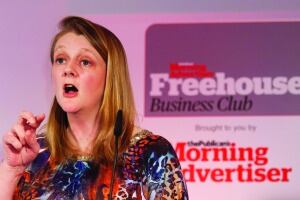Widen your event horizons
James Donoghue, owner of the Pheasant, Gestingthorpe, Essex
Donoghue believes in the value of maximising space in his rural pub. While, traditionally, pub gardens remain cold and empty during the winter months, the garden at the Pheasant is buzzing with the sound of people learning the art of willow weaving.
The pub manages to attract between 12 and 15 people on the courses and the offer is then extended to include food and drink. The course costs £65 per person and introduces new customers to the pub. Courses run twice a year in February and October, and certainly put bums on seats.
Donoghue said he is always on the look-out for what he called “natural ideas”, things that people come up with, such as ‘Thirsty Thursday Night’, an event that gives customers the opportunity to venture out for a drink. There is a strong community element to the event, which brings local villagers together and spawns other events, like brewery tours and barbecues at the village hall.

Don’t expect to find traditional quiz and curry nights at the Pheasant. Donoghue suggested that licensees delve deep into local history and see if there’s anything unusual that can be transformed into a sociable event.
The explorer Captain Oates lived locally and the Pheasant has named one of its letting rooms after the great man. It also devised a celebratory dinner in his honour. In fact, naming rooms after famous local people has proved a great success, as people who Google ‘Captain Oates’ find that the Pheasant at Gestingthorpe pops up as part of their search — putting the pub on their radar.
He encouraged publicans to exchange ideas with each other and engage in brain-storming sessions, as local pubs don’t always have to be in competition with one another. And when it comes to developing your pub, don’t overlook financial assistance in the form of grants. The Pheasant’s rooms cost £500,000 to develop, but Donoghue managed to get half of the money needed from a Government grant.
Yew better believe it
Jon Cox, licensee, Yew Tree Inn, Bunbury, Cheshire
Cox managed to increase turnover at the site to £600,000 in 18 months by introducing a range of quirky events. The marketing plays on the name of the pub — for example, ‘How was it for Yew?’ and ‘We wish Yew a Merry Christmas’.
Cox came up with the idea of wine tasting via Skype — or ‘We can see Yew’ — by trying to go the extra mile. Instead of getting someone into the pub to talk about the wine, he decided it would be more effective to organise a talk from the person who actually made the wine.
“The guy was sat in the middle of his vineyard in New Zealand, sipping the wine, and spoke for an hour and 10 minutes,” said Cox. “It was a complete sell-out, we had 35 people in. We’re planning to do it again this year, this time with a Chilean wine and an evening meal.”
‘Yew could take me home’ came about after Cox realised that the local fish and chip takeaway was not open every day, so he offers pie and chips to take away. He explained that, a lot of the time, when customers come in for a takeaway, they will often have a quick drink while they wait.

Cox also raised the importance of being a freehouse and emphasised that licensees should be more creative because they do not need to run an idea past a head office. “The difference between our pub and the others in the village is they are run by pub companies,” he said. “They have no flexibility because when the licensee wants to do something, they have to go through layers and layers of command. If we want to do something, we can have a quick five-minute meeting and put it into action straight away.”
Use your imagination
Sam Wydmus, owner of the Coastguard, St Margaret’s Bay, Kent
The Coastguard is the closest pub in the UK to France with a maximum 52 covers in winter, shooting up to 300 in summer. “We are a very weather-dependent destination pub,” said Wydmus.
“We have had to be very inventive to fill quieter times and the main thing we have done is tap into the community and capitalise on that.” The pub has always made its own bread and is well-known with locals. Wydmus started making sourdough using a recipe from Babylonian times, which received a lot of press attention, including a mention in the New York Times.

The pub now supplies cakes, pork pies and bread to the local market. “It won’t make us millionaires, but we get to talk to the customers.” Wydmus’s “obsession with old recipes” has earned her a regular slot on local radio, and the pub also runs the UK’s only dedicated historical food festival, complete with minstrels and venison roasts.
“We have become known for being a bit quirky and now I get journalists ringing up and asking what’s going on,” she said. “It is about picking up on people’s imagination — you don’t need PR.”
For full coverage of the event see the 15 March 2012 issue of the Publican's Morning Advertiser. The next Freehouse Business Club will be held in autumn 2012.
